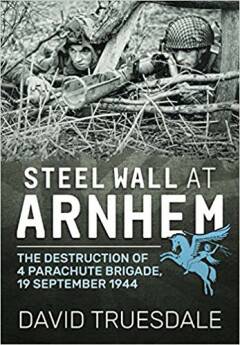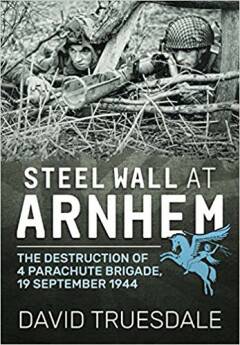
Bedankt voor het vertrouwen het afgelopen jaar! Om jou te bedanken bieden we GRATIS verzending (in België) aan op alles gedurende de hele maand januari.
- Afhalen na 1 uur in een winkel met voorraad
- In januari gratis thuislevering in België
- Ruim aanbod met 7 miljoen producten
Bedankt voor het vertrouwen het afgelopen jaar! Om jou te bedanken bieden we GRATIS verzending (in België) aan op alles gedurende de hele maand januari.
- Afhalen na 1 uur in een winkel met voorraad
- In januari gratis thuislevering in België
- Ruim aanbod met 7 miljoen producten
Zoeken
Steel Wall at Arnhem
The Destruction of 4 Parachute Brigade, 19 September 1944
David Truesdale
Paperback | Engels
€ 41,95
+ 83 punten
Uitvoering
Omschrijving
The deployment of the British 1st Airborne Division somewhere in Europe prior to the end of the war was indeed a case of 'coins burning holes in the pockets of SHAEF.' The Allied High Command was anxious to commit to battle a division that, while it contained some elite units, was not fully trained, had carried out only one divisional exercise and contained several officers who were either unfit or unsuitable for airborne command.
On Monday 18 September 1944, the aircraft and gliders carrying the men and equipment of 4 Parachute Brigade took off from airfields in the south of England. For the first time from its creation in North Africa, the brigade was going into battle as a unified formation, albeit not fully trained and far from experienced. Within 24 hours, the Brigade would cease to exist, having achieved nothing more than the deaths of good men for no good reason.
Despite the fine words of Winston Churchill that the operation had not been 'in vain' and Montgomery's '90% successful, ' there is more logic to be found in the words of the Great War poet Wilfred Owen when he wrote in his poem Dulce et decorum est pro patria mori: there were those commanders who were indeed 'ardent for some desperate glory.' This is a full account of the brigade and its actions at Arnhem.
On Monday 18 September 1944, the aircraft and gliders carrying the men and equipment of 4 Parachute Brigade took off from airfields in the south of England. For the first time from its creation in North Africa, the brigade was going into battle as a unified formation, albeit not fully trained and far from experienced. Within 24 hours, the Brigade would cease to exist, having achieved nothing more than the deaths of good men for no good reason.
Despite the fine words of Winston Churchill that the operation had not been 'in vain' and Montgomery's '90% successful, ' there is more logic to be found in the words of the Great War poet Wilfred Owen when he wrote in his poem Dulce et decorum est pro patria mori: there were those commanders who were indeed 'ardent for some desperate glory.' This is a full account of the brigade and its actions at Arnhem.
Specificaties
Betrokkenen
- Auteur(s):
- Uitgeverij:
Inhoud
- Aantal bladzijden:
- 288
- Taal:
- Engels
Eigenschappen
- Productcode (EAN):
- 9781911628446
- Verschijningsdatum:
- 16/05/2019
- Uitvoering:
- Paperback
- Formaat:
- Trade paperback (VS)
- Afmetingen:
- 170 mm x 244 mm
- Gewicht:
- 861 g

Alleen bij Standaard Boekhandel
+ 83 punten op je klantenkaart van Standaard Boekhandel
Beoordelingen
We publiceren alleen reviews die voldoen aan de voorwaarden voor reviews. Bekijk onze voorwaarden voor reviews.









